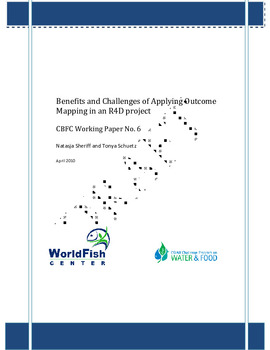Benefits and challenges of applying outcome mapping in an R4D project

Citation
Sheriff, N.; Schuetz, T. (2010). Benefits and challenges of applying outcome mapping in an R4D project. CBFC Working paper no. 6. WorldFish Center, Penang. 8 p.
The Community-based Fish Culture in Seasonal Floodplains and Irrigation Systems (CBFC) project is a five year research project supported by the Challenge Program on Water and Food (CPWF), with the aim of increasing productivity of seasonally occurring water bodies through aquaculture. The project has been implemented in Bangladesh, Cambodia, China, Mali and Vietnam, where technical and institutional options for community based aquaculture have been tested. The project began in 2005 and was completed in March 2010. There is an increasing demand for researchers to demonstrate the impact of the work within project time frames, yet development is a complex, non-linear process emerging from changes that traditional, managerial approaches to development fail to capture or to understand. Methods to address unanticipated change and increasingly important ‘soft’ outcomes, such as improved governance have not yet been widely tested or adopted. In response to this gap, this paper describes lessons learned during the pilot testing of Outcome Mapping as part of an action research process in Vietnam, and presents an abridged OM methodology for application at the community level.
Permalink
Date Available
Type
Countries
Copyright
CC BY 4.0
Research Themes
Language